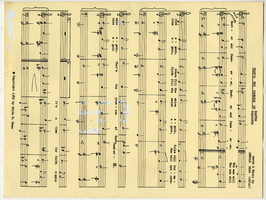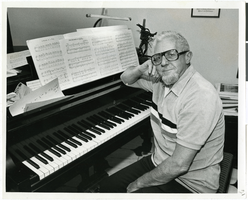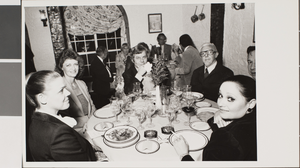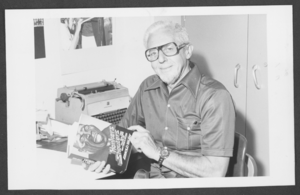"Access to archival materials stored in LASR may be limited at this time."
Search the Special Collections and Archives Portal
Shaw, Arnold, 1909-1989
Description
Arnold Shaw (1909-1989), born Arnold Sokolof, was a music composer, arranger, author, and music historian. Shaw performed and composed music in addition to working as an administrator in the popular music publishing field. He authored numerous books and articles about 20th-century American popular music and lectured at many colleges. Shaw settled in Las Vegas, Nevada in 1968 and joined the faculty of the University of Nevada, Las Vegas (UNLV) where he taught part-time and founded the Arnold Shaw Popular Music Research Center in 1985, which was later named in his honor.
Shaw was born in Brooklyn, New York on June 28, 1909. He received his BA in English literature from the City College of New York in 1929 and his MA from Columbia University in New York City in 1931. He also pursued further studies in American Literature at New York University. Shaw began his career as a pianist and composer in the 1940s. His personal interest in songwriting led him to pursue a career in the popular music publishing field, where he served as an administrator for a variety of publishing houses including Leeds, Hill and Range, and Edward B. Marks. He also handled public relations and advertising for performers such as Elvis Presley, Burt Bacharach, and Paul Simon during the 1950s and 1960s.
While still working at the publishing houses, Shaw began his long and prolific writing career. He wrote hundreds of music reviews, liner notes, and articles. He authored fourteen books, some of which were translated into as many as eleven different languages. Shaw won the ASCAP-Deems Taylor Award in 1968 and 1979, and was also posthumously inducted into the Blues Hall of Fame for his book Honkers and Shouters: The Golden Years of Rhythm and Blues. One of his most popular books, The Street that Never Slept: New York’s Fabled 52nd Street, is a documentation of the two blocks of jazz clubs that presented the who's who of the jazz world for roughly two decades. His books on rock and soul music, as well as his biographies of Frank Sinatra and Harry Belafonte, are also significant contributions to popular music history. Shaw's last two books were The Jazz Age: Popular Music in the 1920s and Let’s Dance: Popular Music of the 1930s.
Shaw moved to Las Vegas in 1968. In 1979, he proposed the creation of a music literature course titled "History of Rock Music," that he would teach on a part-time basis for the University of Nevada, Las Vegas (UNLV) Music Department. The university accepted his proposal and he began teaching the course in the fall of 1980. His purpose was to see how students perceived popular music and the sociological implication of those perceptions. During the ensuing years, Shaw created an event known as a "Rap with the Artist." The purpose of these rap sessions was to create a vehicle by which popular music stars could interact with university students, both through lectures and discussions. The sessions were recorded and added to the interviews of popular music stars that Shaw recorded in the process of authoring his many books. The UNLV Special Collections Department has over nine hundred hours of these tapes. The creation of this tape archive was the official beginning of the Popular Music Research Center at UNLV. After Shaw's death in 1989, the Center was renamed in his honor.




